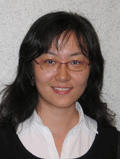By Jayna Miller
The Chemical & Biomolecular Engineering (CBE) Department is pleased to announce the launch of a revised Capstone Senior Design program this fall 2013. In this new format, each faculty member will be advising one or two capstone design projects over the entire academic year.
Prof. Leslie Shor, building on the recent successes of Prof. Dan Burkey in formulating this new format, will be leading the effort for the department. Professor Shor is a Northeast Utilities Assistant Professor of Environmental Engineering Education, and currently leads the Engineered Microhabitats research group.
Professor Shor will be chairing a “Capstone Design Governance Committee,” which will propose guidelines for Capstone Design projects, create templates for project descriptions and general project criteria, and work with faculty to ensure proposed projects meet the criteria. Working with Burkey and Prof. George Bollas, the committee will also create milestone and evaluation rubrics for the faculty and students to follow, and produce an “example design projects catalog,” which can be used to recruit industry sponsors. The overarching goal is to help the department provide the best design experience for students and our industry partners.
 In Capstone Design, our seniors are mentored by chemical engineering faculty and industry sponsors as they apply engineering fundamentals and tools to solve practical engineering problems. Students use this experience to develop teamwork and communication skills as they tackle their open-ended, real-world challenges. They learn about the principles and practices of design, setting priorities, project management, ethical and economic decision making, intellectual property, oral and written communication, all as they evaluate their design from a technical, economic, safety, and environmental perspective.
In Capstone Design, our seniors are mentored by chemical engineering faculty and industry sponsors as they apply engineering fundamentals and tools to solve practical engineering problems. Students use this experience to develop teamwork and communication skills as they tackle their open-ended, real-world challenges. They learn about the principles and practices of design, setting priorities, project management, ethical and economic decision making, intellectual property, oral and written communication, all as they evaluate their design from a technical, economic, safety, and environmental perspective.
The department is actively seeking industry partners to propose and support a student project. For more information, please visit: http://www.cbe.engr.uconn.edu/undergraduate-program/capstone-design and learn how to join our team.








